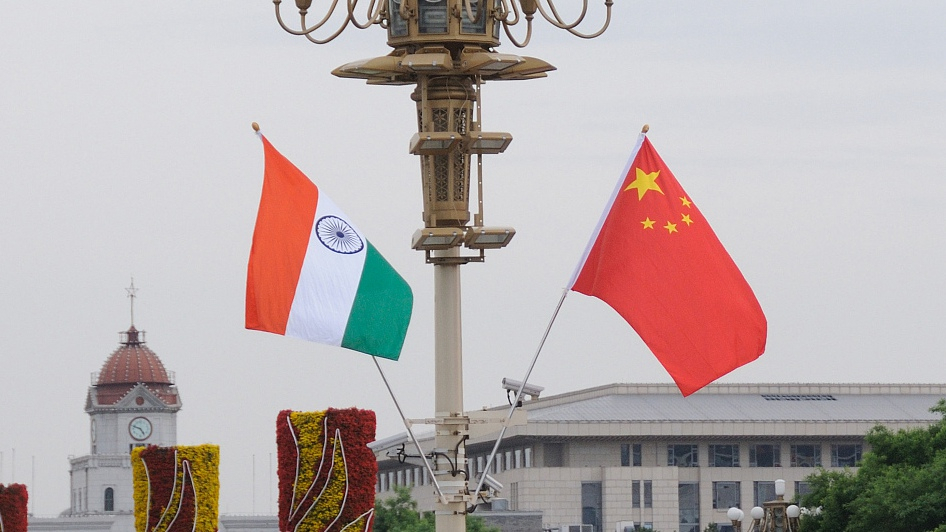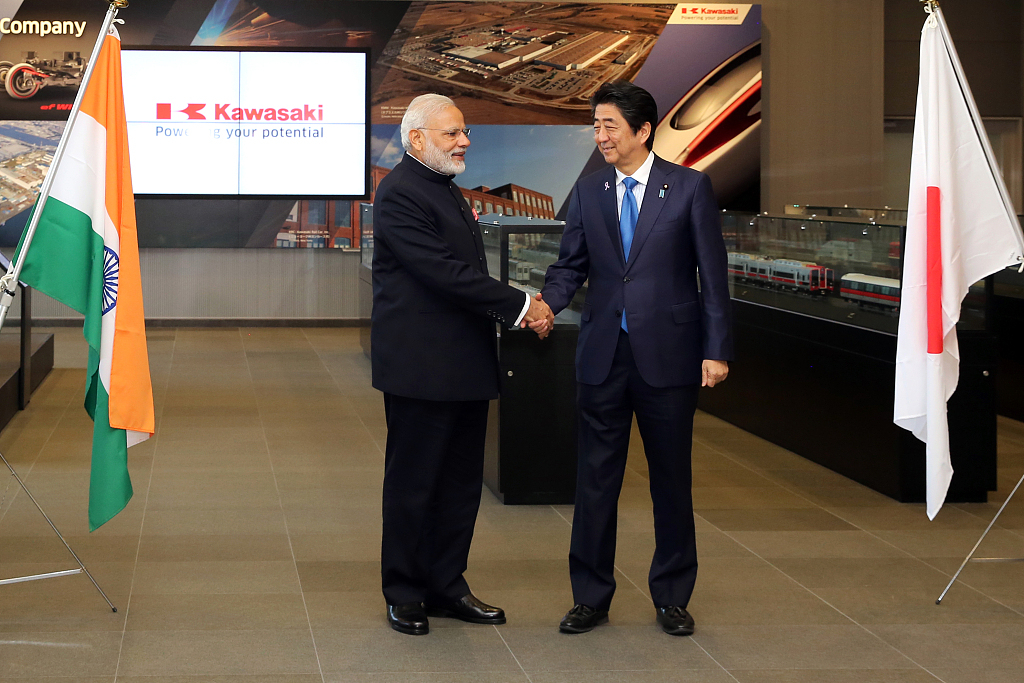

Editor's note: Azhar Azam works at a private organization as a market and business analyst and writes about geopolitical issues and regional conflicts. The article reflects the author's opinions and not necessarily the views of CGTN.
Defense cooperation between India and Japan is growing rapidly. Alongside the United States, both countries will be holding a trilateral maritime exercise – Malabar 2019 – in Japan later this month. Malabar originally was a bilateral naval drill comprising New Delhi and Washington, which launched in 1992. Japan joined as a permanent partner in 2015.
Apart from Malabar, another trilateral war games, mine-countermeasures exercise (MINEX), will be conducted annually by the countries, according to India's Defense Minister Rajnath Singh. The announcement was made during a recent meeting with Japanese Defense Minister Takeshi Iwaya.
After the meeting, the Indian defense ministry confirmed that there has been a significant progress on an Acquisition and Cross-Servicing Agreement (ACSA), a military logistics arrangement, with Japan. Last week, India also signed such an agreement with South Korea.
India and Japan would ink an ACSA by the end of the year and initiate an extension of logistic support to each other's navies. India's separate strategic pacts with Japan and South Korea are likely to bolster New Delhi's bilateral defense cooperation to meet the countries' strategic military ambitions amid China's rise.
While Singh and Iwaya had a rare discussion on the South China Sea, with an ACSA in the pipeline, India and Japan will take a stride forward in sharing military logistics for greater interoperability and navigation in the South China Sea. As the U.S. has been proactive in the region, the water body is of vital national interest and sovereignty for China.
The Indian defense ministry said Indian and Japanese ministers "recognized that peace and stability of the Indian and Pacific Oceans" are needed to ensure prosperity in the Indo-Pacific region, and stressed "frank exchange of views" on the developments in the South China Sea. This underscored a major shift in Indian foreign policy.
India has long ducked any reference to South China Sea but the latest comments signal its renunciation of its prior position. While India's unilateral action to administratively separate Ladakh from Jammu and Kashmir has not cooled down yet, its renewed approach threatens to fracture its ties with China.
Iwaya's remarks about discussing "China's military activities" with Singh and the Indian reticence after its defense ministry's press release created further doubts. New Delhi therefore should come up with a clear stance about its perspective on the Indo-Pacific region and the South China Sea.
India needs to clear its position also because on September 5, Indian Prime Minister Narendra Modi met his Japanese counterpart Shinzo Abe on the sidelines of the 5th Eastern Economic Forum (EEF) in Vladivostok and "expressed his intention to take concrete steps to cooperate toward the realization of common vision of the Indo-Pacific."

Indian Prime Minister Narendra Modi (L) and Japanese Prime Minister Shinzo Abe shake hands during a visit in Kobe, Hyogo Prefecture, Japan, November 12, 2016. /VCG Photo
The two leaders' meeting in Russia was their third in three months, after the G20 Summit in Osaka, Japan, and the G7 Summit in Biarritz, France. According to Japanese media, the leaders discussed security cooperation and efforts to maintain stability in the Indo-Pacific region.
Abe will be visiting India in December and the first 2+2 ministerial meeting, which comprises foreign and defense ministers from both sides, is expected to take place before his arrival.
Improved relations with any country is a sovereign right of India, and China acknowledges this prerogative. Unlike Washington, Beijing does not coerce its allies into a "you're with us or against us" situation. However, it expects its partners to be transparent in their bilateral dealings and more importantly, respect its sovereignty such as in the South China Sea.
The portrayal of Chinese State Councilor and Foreign Minister Wang Yi's visit to Pakistan as a consequence of the delay in holding a round of the special representatives talks on boundary issues with Indian national security adviser Ajit Doval misses the point.
Wang's visit to India was not postponed because of Pakistan's reservations, China's Ministry of Foreign Affairs said, explaining that the delay had to do with "India's schedule."
China's relations with almost all its neighbors are cordial so it is always prepared to resolve border and all other disputes with India through dialogue. But since Japan and the U.S. are trying to derail China's efforts to maintain peace in the East China Sea and the South China Sea, India needs to be mindful.
Like Malabar 2016, this year's naval drills will be conducted in Japanese water. Thus, Tokyo could again use the exercise to spy on China's military deployment and divert Chinese attention from the South China Sea and East China Sea.
As tensions rise in the region, China expects India to clear its opaque position on the Indo-Pacific, the East China Sea, and the South China Sea, which would help Beijing maintain peace and stability in the region.
(If you want to contribute and have specific expertise, please contact us at opinions@cgtn.com.)

Copyright © 2018 CGTN. Beijing ICP prepared NO.16065310-3
Copyright © 2018 CGTN. Beijing ICP prepared NO.16065310-3